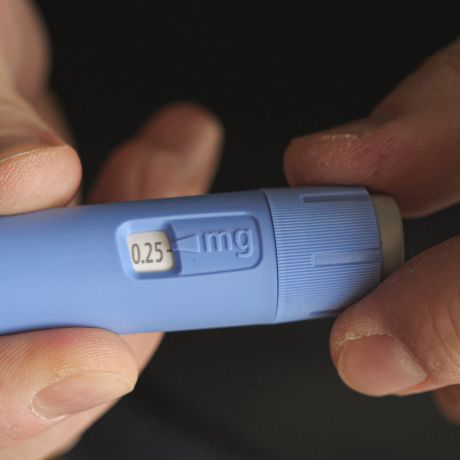Over the past decade, diabetes has reached epidemic proportions, but advances in medical research consistently give people battling this chronic ailment fresh hope. One such development is Ozempic, a ground-breaking drug in the sort 2 diabetes therapy toolbox.
Ozempic is the most well-liked brand name for the medication semaglutide. Because of its effectiveness in controlling blood sugar level in diabetics, it has grow to be a source of hope for hundreds of thousands of patients worldwide. It is also grown in popularity for those without diabetes simply trying to drop some pounds. Nonetheless, as with every medical procedure, Ozempic has its intricacies, and concerns about its potential antagonistic effects still exist.
One recurrent topic jumps out among the many issues expressed by people considering Ozempic: Does semaglutide cause headaches?
That is the query we tackle in this text, with an in-depth exploration of the scientific environment surrounding semaglutide and its conceivable connection to headaches.
Table Of Contents
- Short-Term And Long-Term Side Effects
- Can Semaglutide Unlock Your Weight Loss Journey?
- How Semaglutide Works For Weight Loss
- Who Should Take Semaglutide?
- Accessing Semaglutide For Weight Loss
- FAQs
Short-Term And Long-Term Side Effects
Short-term Ozempic risks & unwanted effects include:
- Nausea, Severe Stomach Pain, Diarrhea, Vomiting: These symptoms typically subside once the body gets used to the drug.
- Hypoglycemia: Semaglutide won’t induce hypoglycemia (low blood sugar) by itself but may achieve this when used together with such diabetes drugs as insulin and sulfonylureas.
- Injection Site Pain: Semaglutide is provided by subcutaneous injection, and a few people may suffer slight pain, redness, or edema where the medication was injected.
- Loss Of Appetite: Semaglutide users occasionally report a drop in appetite, which might aid in weight reduction but in addition impact food habits on the whole.
Potential long-term unwanted effects of semaglutide use are as follows:
- Thyroid Tumors: Semaglutide has been linked to increased thyroid cancer incidence in female rats. Nonetheless, it will not be clear that these effects also relate to humans.
- Pancreatitis: There have been a couple of reports that administration of GLP-1 receptor agonists has led to inflammation of the pancreas (pancreatitis). Symptoms of this condition include nausea, stomach pain, and vomiting. In the event you experience them, seek medical attention immediately.
- Gallstones: Some people could also be more liable to gallstones while taking semaglutide.
- Renal Function: Semaglutide may influence renal function, so regular monitoring of renal function is suggested.
- Allergic Response: Serious allergic reactions to semaglutide are very rare, but they’re a possibility. Symptoms include a skin rash, respiratory difficulty, and swelling of the lips and tongue.
Can Semaglutide Unlock Your Weight Loss Journey?
Semaglutide was originally developed to treat type 2 diabetes. Classified under a category of medicines called GLP-1 RAs (glucagon-like peptide-1 receptor agonists), it regulates hunger and helps with blood sugar control.
Researchers noticed an unexpected effect during clinical studies of its ability to lower blood sugar levels: patients lost a considerable amount of weight. This finding sparked additional research into semaglutide’s potential as a weight-loss drug.
As such, the power of semaglutide to assist people drop some pounds has been investigated in a lot of clinical trials. The STEP 1 experiment, a landmark study, comprised patients who were chubby or obese but didn’t have diabetes. Throughout the experiment, those that got semaglutide as a subcutaneous injection lost a formidable 15% of their body weight on average. This result was noticeably higher than what is usually completed with lifestyle changes alone.
Since, semaglutide has been found to act as a weight reduction medication in 3 ways:
- Semaglutide appears to suppress appetite, which ends up in a discount in caloric intake. Individuals who experience this impact may select healthier foods and limit their portions.
- Semaglutide can decelerate the stomach’s emptying, promoting feelings of fullness and lowering the need to eat between meals.
- Semaglutide is assumed to spice up energy expenditure, enabling the body to burn more calories.
Although semaglutide has potential as a weight-loss tool, it can be crucial to make use of it fastidiously and under a health care provider’s supervision. In comparison with the quantity indicated for treating diabetes, the drugs is commonly prescribed in greater doses for weight reduction. Ensure to extensively explore potential unwanted effects and contraindications with a healthcare skilled.

How Semaglutide Works For Weight Loss
Several physiological processes that affect hunger, calorie intake, and energy expenditure are a part of the mechanism of motion for weight reduction with semaglutide. Let’s break them down:
1) GLP-1 Receptor Agonization
Semaglutide is a GLP-1 receptor agonist (GLP-1 RA). The GLP-1 hormone, produced within the intestines, significantly controls hunger and blood glucose balance. Semaglutide attaches to GLP-1 receptors and mimics the actions of the hormone (1).
2) Suppression Of Appetite
Semaglutide inhibits the feeling of hunger by activating GLP-1 receptors within the brain’s centers for appetite. This impact can suppress appetite, which can lead to fewer calories consumed and weight reduction in consequence.
A 2017 double-blind placebo-controlled study gave 1 mg of subcutaneous semaglutide to 30 obese people over 12 weeks. In comparison with a placebo group, the semaglutide group consumed significantly less food during all meals, with a 24% reduced caloric intake over the study period (2).
3) Delayed Gastric Emptying
Semaglutide can delay the gastric motility process, which causes the stomach to empty more slowly. Consequently of the delayed stomach emptying, you are feeling fuller for longer and have less appetite, which helps you eat less (3).
In a single study examining the effect of glucagon-peptide-1 on gastric emptying, eighteen men got either GLP-1 or a saline placebo. Gastric emptying was measured using paracetamol as a marker and emptying rates were seen to be lower within the GLP-1 group (4).
4) Improved Insulin Sensitivity
Semaglutide may enhance insulin sensitivity, enabling cells to soak up glucose from the bloodstream more efficiently. Higher blood sugar management and indirect weight management may each be supported by improved insulin sensitivity (5).
5) Potential Enhancement In Energy Expenditure
Although the actual mechanism will not be entirely known, several studies indicate that GLP-1 RAs like semaglutide may enhance energy expenditure, enabling the body to burn more calories.
A 2001 study examined how a dose of glucagon-like peptide-1 (GLP-1) infusion affected feelings of hunger and energy metabolism. The findings demonstrated that GLP-1 infusion decreased sensations of hunger and potential post-breakfast food consumption (6).
Moreover, it dramatically reduced stomach emptying rate, glucose oxidation, and resting metabolic rate. This shows that GLP-1 may help with weight reduction by successfully slowing the pace at which nutrients enter the bloodstream.
6) Reduced Emotional And Reward-Based Eating
Semaglutide may affect brain areas involved in emotional and reward-based eating behaviors (7). Changing how people perceive food rewards may end up in lower consumption of calorie-dense, appealing foods.

Who Should Take Semaglutide?
In the event you’re considering taking Ozempic semaglutide for weight reduction, listed below are a dozen considerations to take note of to show you how to make an informed decision:
- Speak With A Healthcare Skilled: Make an appointment for an intensive consultation with a healthcare skilled, preferably one with experience in diabetes or weight management, before starting semaglutide for weight reduction. Discuss your medical history, present health, and weight reduction objectives.
- Determine Qualification: Based in your body mass index (BMI) and any underlying medical issues, your healthcare practitioner will determine whether semaglutide is an excellent fit for you.
- Examine Additional Options: Look into other weight reduction techniques together with your healthcare physician. These could include behavioral therapies, dietary modifications, and increased physical activity. Only when previous methods haven’t produced the intended outcomes should semaglutide be considered.
- Recognize The Benefits: Clinical trials on semaglutide have demonstrated that it causes considerable weight reduction. Recognize that using it could significantly enhance your weight, metabolic health, and general well-being.
- Talk About Possible Risks: Semaglutide can have dangers and unwanted effects, including gastrointestinal problems, the opportunity of thyroid tumors (most frequently reported in animal trials), pancreatitis (albeit rare), and gallbladder and kidney problems. The potential benefits have to be in comparison with these risks.
- Establish Reasonable Goals: Discuss reasonable expectations for weight reduction together with your doctor. Regardless that semaglutide can provide substantial weight reduction, individual outcomes may differ.
- Dosage And Surveillance: Together together with your healthcare skilled, determine the right semaglutide dosage. In comparison to managing diabetes, weight reduction often requires higher doses. Create a monitoring plan to observe your progress and assess any severe unwanted effects beforehand.
- Supplemental Lifestyle Modifications: Recognize that an excellent eating regimen and frequent exercise are best coupled with semaglutide for max effectiveness. You’ll be able to develop a customized plan with the help of your healthcare provider or take a take a look at How To Successfully Use Meal Preparation For Weight Loss and the 6 Best Fat Burning HIIT Workouts For Weight Loss.
- Repeated Follow-Up Visits: Make a commitment to go to your doctor for follow-up appointments continuously. These visits are crucial for tracking how the drug works, addressing any issues, and making any mandatory modifications.
- Individualized Strategy: Recognize that using semaglutide must be a really individualized selection. Your particular health profile and weight control requirements shall be taken into consideration by your healthcare provider.
- Continuous Communication: Throughout your semaglutide treatment, keep the lines of communication together with your healthcare practitioner open and honest. Immediately report any unusual or severe antagonistic effects.

Accessing Semaglutide For Weight Loss
Listed here are the steps that you must follow if you happen to intend taking semaglutide for weight reduction:
1) Consulting a Healthcare Skilled
Step one in obtaining semaglutide for weight reduction is speaking with a healthcare skilled. Discover a healthcare provider specializing in endocrinology, diabetes, or weight control.
In the middle of this initial consultation, be certain that to do the next:
- Discuss your history and goals for weight reduction. Give an intensive medical history that features any underlying health issues.
- Tell them in regards to the drugs you take now, your allergies, and your lifestyle decisions.
- Based in your BMI, medical history, and general health, your healthcare practitioner will determine whether semaglutide is appropriate to your weight control requirements.
2) Eligibility Assessment
Your healthcare practitioner will determine whether you’re eligible for semaglutide by making an allowance for variables like:
- Body Mass Index: Semaglutide is continuously administered to patients with a BMI above a predetermined cutoff, often 30 or higher, or 27 or higher in patients with concomitant conditions akin to type 2 diabetes.
- Existence of Comorbidities Associated With Obesity: Your doctor will determine whether you’ve any conditions like diabetes, hypertension, or high cholesterol which can be linked to obesity.
3) Discussion Of Available Alternative Treatments
Your healthcare skilled will go over various weight-management alternatives, akin to dietary and activity modifications, behavioral treatments, and drugs. Semaglutide should only be pursued if other methods have failed to supply the specified weight reduction.
4) Writing The Prescription
If it’s determined as the perfect option for you, your doctor will write a prescription for semaglutide and choose on the proper dosage.
5) Monitoring Strategy
Your doctor will create a dose or medication schedule to maintain tabs in your development. Regular follow-up appointments to judge weight reduction, unwanted effects, and general health could also be a part of this.
6) Get Semaglutide From a Drugstore
In any case of the discussion takes place and you’ve your prescription ready, you’ll be able to pick it up from a drug store. Semaglutide is usually administered as a subcutaneous injection, so make certain you realize find out how to administer and keep the medication appropriately.
For more details about storage, read Should Ozempic Be Refrigerated?

FAQs
Let us take a look at some more of your questions on the unwanted effects of semaglutide.
Why am I getting headaches on Ozempic?
Some people may feel headaches at first of their Ozempic treatment. These headaches might be a side effect of the medication’s body-adjusting process and may improve as your body adjusts to it.
Ozempic is primarily used to manage blood sugar levels, and it may lead to higher glucose regulation. Ozempic headaches may result out of your body adjusting to variations in blood sugar levels in the event that they are quickly stabilizing or declining.
How do you do away with a semaglutide headache?
In the event you are getting headaches from taking Ozempic, we propose the next:
- Hydrate: Ensure you take in loads of water, as dehydration contributes to headaches.
- Try over-the-counter pain relief medication akin to Ibuprofen or Advil
- Get loads of rest, ideally in a quiet, dark environment.
- Engage in stress reduction practices akin to deep respiratory, meditation, or yoga.
- Keep a headache diary to discover triggers.
- Adjust your medication, but only do that together with your doctor.
Do headaches from Ozempic go away?
Yes, headaches from Ozempic often go away inside a few weeks once the body has adjusted to the medication. In case your headaches persist beyond two weeks, it is best to see your doctor.
What are essentially the most common unwanted effects of semaglutide?
Essentially the most common unwanted effects of semaglutide are:
- Nausea
- Abdominal pain
- Vomiting
- Diarrhea
- Constipation
- Dizziness
- Injection site reactions
- Hypoglycemia (low blood pressure) when taken together with some diabetes medications
Summary Of Semaglutide And Headaches
Semaglutide offers hope for people searching for practical solutions to obesity. Its remarkable impact on weight reduction, demonstrated through clinical trials and real-life success stories, underscores its potential to rework lives.
Nonetheless, as with every medication, Semaglutide will not be without its risks. Its unwanted effects, including gastrointestinal symptoms and the necessity for injection, require thoughtful evaluation and management. Individual responses can vary, and a healthcare skilled should guide its use.

References
- Pi-Sunyer, F. X. (2014). Medical treatment of obesity. JAMA, 312(9), 983-984.
- Blundell J, Finlayson G, Axelsen M, Flint A, Gibbons C, Kvist T, Hjerpsted JB. Effects of once-weekly semaglutide on appetite, energy intake, control of eating, food preference and body weight in subjects with obesity. Diabetes Obes Metab. 2017 Sep;19(9):1242-1251. doi: 10.1111/dom.12932. Epub 2017 May 5. PMID: 28266779; PMCID: PMC5573908.
- Vilsbøll T, Christensen M, Junker AE, Knop FK, Gluud LL. Effects of glucagon-like peptide-1 receptor agonists on weight reduction: systematic review and meta-analyses of randomised controlled trials. BMJ. 2012 Jan 10;344:d7771. doi: 10.1136/bmj.d7771. PMID: 22236411; PMCID: PMC3256253.
- Flint A, Raben A, Ersbøll AK, Holst JJ, Astrup A. The effect of physiological levels of glucagon-like peptide-1 on appetite, gastric emptying, energy and substrate metabolism in obesity. Int J Obes Relat Metab Disord. 2001 Jun;25(6):781-92. doi: 10.1038/sj.ijo.0801627. PMID: 11439290.
- Once-weekly semaglutide in adults with chubby or obesity. (2021). Recent England Journal of Medicine, 385(1). https://doi.org/10.1056/nejmc2106918
- Flint A, Raben A, Ersbøll AK, Holst JJ, Astrup A. The effect of physiological levels of glucagon-like peptide-1 on appetite, gastric emptying, energy and substrate metabolism in obesity. Int J Obes Relat Metab Disord. 2001 Jun;25(6):781-92. doi: 10.1038/sj.ijo.0801627. PMID: 11439290.
- Farr, O.M., Sofopoulos, M., Tsoukas, M.A., Dinçer, F., Thakkar, B., Sahin-Efe, A., Filippaios, A., Bowers, J.G., Srnka, A., Gavrieli, A., Ko, B., Liakou, C., Kanyuch, N., Tseleni-Balafouta, S., & Mantzoros, C.S. (2016). GLP-1 receptors exist within the parietal cortex, hypothalamus and medulla of human brains and the GLP-1 analogue liraglutide alters brain activity related to highly desirable food cues in individuals with diabetes: a crossover, randomised, placebo-controlled trial. Diabetologia, 59, 954-965.






